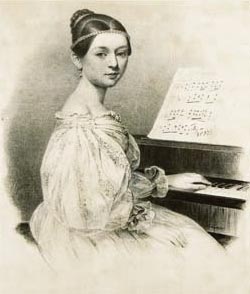 |

„Clara Schumann’s Life“
Piano and recitation: Elisabeth Eschwé
On the occasion on Clara Schumann’s 200th anniversary in 2019, a scenic piano recital with Elisabeth Eschwé staging Clara Schumann from her early childhood under the tutorial guidance of her father Friedrich Wieck, to the celebrated prodigy, secret lover and wife of Robert Schumann, to a grief stricken mother and widow, and finally her years as internationally reknown pianist and lifelong friend of Johannes Brahms.
Copyright © 2018
Piano pieces by Clara Wieck/Schumann, Robert Schumann und Johannes Brahms
| Robert Schumann: |
Papillons Op. 2 |
| Clara Wieck: |
Caprice en forme de valse Op. 6/1 |
| Robert Schumann: |
from Carnaval Op. 9 “Chiarina, Aveu” |
| Robert Schumann: |
Introduction of the f sharp minor sonata |
| Clara Wieck: |
Caprice en forme de valse Op.6/3 |
| Robert Schumann: |
Fantasiestück Op.12 “Why” |
| Clara Wieck: |
Caprice en forme de valse Op.6/4 |
| Robert Schumann: |
Novelette Op.21/1 |
| Clara Schumann: |
Agitato Op.21/3 |
| Clara Schumanm: |
In loving remembrance, Op.posthum |
| Johannes Brahmns: |
Variations on a theme by Schumann |
| Clara Schumann: |
Intermezzo to Johannes Brahms |
| Johannes Brahms: |
Three Waltzes Op. 39 |
| |
Intermezzo Op.117/2 a minor |
| |
Intermezzo Op. 119/3 c major |
| |
Capriccio Op.116/7 d minor |
Letters to Emilie und Elise List
Verlag Metzler, Stuttgart, Weimar, 1996
Clara Schumann - Johannes Brahms Letters
edited by Berthold Litzmann, Breitkopf & Härtel, Leipzig, 1927
Clara Schumann – An Artist’s Life
edited by Berthold Litzmann, Breitkopf & Härtel, Leipzig, 1902
Letters to Robert Schumann
edited by E. Weissweiler, 1984
Videos of „Clara Schumann’s Life“
|
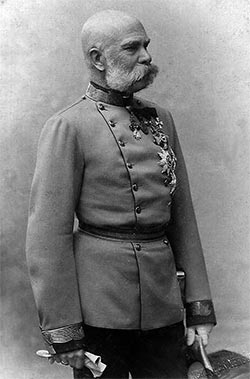 |
„The Emperor Franz Josef and the Music of His People“
Violin: Arkadij Winokurow, piano and recitation: Elisabeth Eschwé
An unusual portrait of Franz Joseph I, who was the longest-reigning monarch of the Austro-Hungarian Empire, with music from Hungary, Slowakia, Moravia, Bohemia, Croatia, Ukraine, Poland and Austria as well as texts by Austrian writers and letters by the monarch and his wife.
Works for violin and piano by Béla Bartok, Jenö Takács, Oskar Nedbal, Leo Janacek, Dora Pejacevic, Myroslav Skoryk, Karol Szymanowsky, Alexander Zemlinsky, Fritz Kreisler.
Letters by Kaiser Franz Joseph to his lover, Katharina Schratt
Poems by Sisi, Empress of Austria and Queen of Hungary
Otto Friedländer: Fading Glory of Vienna
Josef Roth: Radetzkymarsch
Sándor Marai: Die Glut
Vienna Journal (1853 und 1914)
Idea and realisation: Elisabeth Eschwé
Copyright © 2015
|
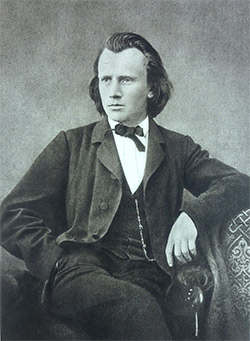 |
„You are eternally dear to me“
Johannes Brahms (1833-1897) and Clara Schumann (1819-1896)
A scenic piano recital about an outstanding friendship and love that lasted from 1854 until Clara’s death in 1896, reflected by Brahms’ piano works (excerpts) and his correspondence with Clara Schumann.
Piano and narration: Elisabeth Eschwé
Intermezzo op. 119/3 C-major, grazioso e giocoso
Variations on a theme by Robert Schumann Op. 9
Hungarian dance No. 17
Waltzes op. 39 No. 1, 2, 3
Variations on a Theme by Handel Op.24
Intermezzo op. 116/2 a minor
Intermezzo op. 117/2 b flat minor
Capriccio op. 116/7 d minor
Copyright (C) 2013 Elisabeth Eschwé.
Texts
From the correspondence between Clara Schumann und Johannes Brahms
Edited by B. Litzmann, Breitkopf & Härtel, Leipzig, 1927
Clara Schumann’s Diary
In: Clara Schumann – ein Künstlerleben
Edited by B.Litzmann, Breitkopf & Härtel, Leipzig, 1902
Background
First Contact
Johannes Brahms entered the Schumann’s household on September 30, 1853 to play for the master. Robert was fourty-three, his wife Clara thiry-four years old.
Robert noted in his diary, „This month brought a most wonderful visitation, personified in the twenty year old Johannes Brahms from Hamburg. This man is one of those who comes as if straight from God.“ After an attempt of suicide in March 1854 Robert Schumann was confined in the mental asylum of Endenich. He was forbidden any contact with his family and his letters were censored. Clara was in despair, expecting the Schumann’s eight child, Felix. Friends were there to help, among them Brahms, who hurried to Dusseldorf to brighten up Clara and her eight children.
Romance
Brahms assisted her as an admirer of her art and youthful friend. He lodged above the Schumann apartment, looked after her children; and, being no family member, was also allowed to visit Robert.
In later years Clara and Johannes decided to exchange their letters, of which Clara destroyed hers of the years 1854-58. Only a few of Brahms have survived. From these we learn that Brahms’ was torn between his love of Clara and respect for Robert. In a letter of May 1856 he declared „you are so infinitely dear to me that I can hardly express it“.
Friendship
The correspondence of 800 letters handed down to us gives testimony of a deep felt relation and friendship. When Clara bought a house in Baden-Baden, Brahms moved into a villa nearby to spend the summers with Clara and her children. They went on concert tours together to Vienna, England and Holland. Brahms much valued Clara’s musical taste. He would not publish a work before Clara had not given her critical opinion. Johannes never married. His last piano works, masterpieces in themselves, musically relate his feelings for Clara. Her entry in her diary reads, „Brahms has sent me 11 of his piano pieces, still unprinted- what a source of pure delight for me; there is everything in them, poetry, passion, devotion, affection, all infused with magnificent tone colours …”
A month before she died Brahms wrote to his friend Joachim, „... the thought of losing her cannot frighten us any longer, not even me, who is a loner in this world; and when she will have passed away, will our faces not glow with happiness having known this wonderful woman a long life – only in this way we will mourn her.“
|
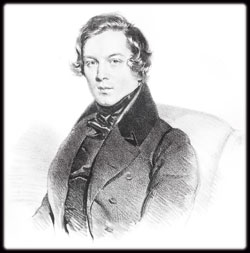 |
 "Music of a Love" "Music of a Love"
piano and narration: Elisabeth Eschwé
Music of a Love describes the dramatic love story between Clara Wieck and Robert Schumann, which has become one of the most famous love stories of the 19th century.
Robert Schumann, inspired by his ardent love to the prodigy Clara Wieck, wrote his boldest piano pieces, among which are Carnaval, Fantasiestücke, Fantasy in C Op.17, Scenes from Childhood. The time between 1832, when they met and their wedding in 1840 was a most creative period in his life. Clara's diary and letters tell about her agony being torn between her dominating father, Friedrich Wieck and her lover, Robert Schumann. The music illustrates the emotional turmoil of the dramatic incidents, hence, becomes a musical testimony of his biography.
Copyright (C) 2006 Elisabeth Eschwé. All rights reserved.
Programme
Original excerpts from the following compositions by Robert Schumann and texts by Clara Wieck
Papillons Op. 2: 1,2,3,4
Impromptus Op. 5 on a theme by Clara Wieck, Nr. 1 und 2
Carnaval Op.9: Estrella (Ernestine), A.S.C.H., Chiarina (Clara), Aveu
Sonate fis-moll Op. 11: Introduction, Aria
Davidsbündlertänze Op. 6/1 Florestan und Eusebius
Novelletten Op. 21:1 (Excerpt)
Fantasie in C Op. 17 (Excerpt from 3rd movement)
Scenes from Childhood Op.15
Of foreign lands and people, Hark, the poet speaks (Von fremden Ländern und Menschen, Der Dichter spricht)
Fantasiestücke Op. 12
Why, In the Night, End of the Song (Warum, In der Nacht, Ende vom Lied)
B. Litzmann: Clara Schumann, Ein Künstlerleben, Breitkopf und Härtel, Leipzig, 1902
E. Weissweiler: Clara und Robert Schumann Briefwechsel, Stroemfeld, Roter Stern, 1984
E. Wendler: Das Band der ewigen Liebe, Metzler Verlag, Stuttgart, Weimar, 1996 Premièred at Pötzleinsdorf Castle, Vienna on the 150th anniversary of Robert Schumann's death on 27th Sept. 2006. Performances in Ehrbar Saal Vienna, Gmünd, a.o.
Biographical background
Childhood
Clara Wieck's early childhood is traumatized by losing her mother, who divorced her husband. The girl Clara seems to be retarded, and does not talk before she is eight years old. Her world is the world of music, she receives regular piano training from her father Friedrich Wieck from the age of five. When she is eight she gives her first solo recital, at 12 she goes on her first concert tour to Paris, and becomes known as a piano prodigy all over Europe. At home her father plays a dominant role, he is an unquestioned authority: rule and order guard her life, daily musical and intellectual training, physical exercise mark her early years, but there is hardly room for laughter and merriment.
Robert Schumann receives a loving, well-caring education. His father is a book dealer and does not only promote his intellectual but also his musical education. He dies but all too young, Robert's sister commits suicide. Eighteen-year old Robert feels himself "being fatherless expelled into existence". He studies philosophy at Leipzig University, composes, continues studies of law at Heidelberg University to please his mother, and finally discontinues his studies to study piano. When Robert moves into Wieck's household he is twenty and Clara eleven years old; her life becomes brighter and more cheerful.
The Romance
Friendship gradually turns into love. Robert and Clara find means and ways to meet secretly, despite Wieck's despotic control. Friedrich Wieck opposes their bond from the beginning, because he sees his daughter's career endangered. In the August of 1837 the lovers get engaged secretly. Idealizing Robert as she had idealized her father, Clara falls into a psychological dilemma. Her love of Robert becomes his source of inspiration. Desperately, Wieck files a trial of libal and slander against Schumann. After two years of legal proceedings Clara and Robert win the case at the Leipzig Court of Appellation and become married in 1840.
The Marriage
The wedding on 12th September 1840 marks the beginning of 14 years of the married life of two geniuses. Clara gives birth to eight children. Felix is born after Schumann's hospitalization at Endenich in 1854. Despite all marital problems Clara and Robert remain sources of inspiration for each other, their destinies linked with each other.
|
 |
"An Evening with Clara Schumann"
Piano and narration: Elisabeth Eschwé
A scenic recital with Elisabeth Eschwé starring Clara Schumann as a pianist virtuosa, mother, wife, lover and manager.
Plot: a flashback of Clara's dramatic life from her 16th to her 76th birthday
Copyright (C) 1999 Elisabeth Eschwé. All rights reserved.
Programme
Original excerpts from Clara Schumann's compositions and texts
Caprice en forme de valse, Op.2/1,2,4,6
Romance Op.21/3 Agitato
Romance h-moll "in loving remembrance" op. posthum
Romance Op. 21/1
Dedicated to Johannes Brahms
Prelude und Fugue Op. 16
Souvenir de Vienne, Impromptu Op. 9
Variations on a theme by Robert Schumann Op. 20
Letters to Emilie and Elise List
edited by J. Wendler, Stuttgart, Weimar 1996
Letters between Clara Schumann and Johannes Brahms
edited by B. Litzmann, Breitkopf&Härtel, Leipzig 1927
Clara Schumann – an Artist's Life
edited by B. Litzmann, Breitkopf&Härtel, Leipzig 1902
Biografie Clara Schumann
born Leipzig Sept. 13th 1819 – died in Frankfurt May 20, 1896
The eldest child of Friedrich and Marianne Wieck began to study the piano at the age of 5 with her father. She made her debut at the Leipzig Gewandhaus when she was 9 and travelled on her first concert tour to Paris at the age of 12. By 1835 she was acclaimed throughout Europe as a child prodigy; her admirers included Goethe, Liszt, Chopin, Grillparzer and Schumann.
Robert Schumann, who had studied with Wieck since 1830, asked him for permission to marry Clara in 1837, starting a fierce battle. After attempts by Wieck at slander and sabotage, Clara fled to her friends, the List family, in Paris. From there grew a lifelong friendship with the sisters Emily and Elise List. Clara and Robert eventually took their case to court and after a favourable ruling were married on 12 September 1840.
The Schumanns lived in Leipzig, Dresden and Düsseldorf, Clara gave birth to eight children – Marie (1841), Elise (1843), Julie (1845), Emil (1846), Ludwig (1848), Ferdinand (1849), Eugenie (1851) and Felix (1854) – of whom only three outlived their mother. Clara gave concerts extensively all over Europe, composed piano and chamber music and became widely influential as a teacher.
After Robert's breakdown in 1854 and his hospitalization at Endenich, where he remained until his death in 1856, Clara had to care for seven children. Johannes Brahms proved a devoted companion, and he and Clara formed an extremely close friendship that lasted until her death. The extent of their relationship remains uncertain, as they destroyed a large amount of their correspondence.
Clara continued her career as a pianist of highest rank and was a sincere interpreter of works by her husband and Brahms. She was awarded a professorship at Frankfurt Conservatorium and edited all of Schumann's works. Despite growing hearing problems and rheumatic pains, she continued her active life, performed and taught until she was in her nineties.
|
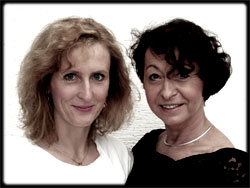 |
"Femmes Classiques"
Piano und soprano: Elisabeth Eschwé und Ulrike Sych
Script: Sepp Tatzel
A concert pianist and a soprano are rehearsing for a new programme. It should be entertaining but at the same time involve classical music: however they don't stay serious ….
In a cheeky and obscene way they criticize role models and taboos of modern society. The show makes a somersault from modern music into satire and parody. It makes fun of our sex driven society and erratic drives. By keeping a serious undertone it makes you uncertain and self-reflective.
The music is a detour from Schubert, Mozart, Rossini, via Schönberg, Satie, Jacques Brèl to the Broadway and back.
|
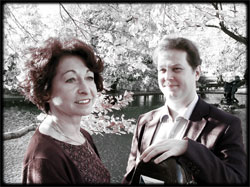 |
“Forgotten Vienna”
Vienna and Viennese lifestyle from 1900-1945
Elisabeth Eschwé – Piano and Narration Orfeo Mandozzi – Violoncello
Who is truly Viennese? Someone who was born there, who immigrated, who was expelled, or who has always remained a stranger? Rarely played and recently rediscovered pieces for cello and piano by composers who were either Viennese or based in the city during the early part of the 20th century, as well as poetry and prose by Austrian writers from the time of the Habsburg Monarchy to the Second World War, piece together a collage that tells a story of Vienna and its people. Not attempting to give a conclusive answer, the programme reflects both the historic events, whose effects are still felt today, as well as the authors´ love of the city, with the mixture of disdain, melancholy and humour that is typical of the "true Viennese."
Music by
Arnold Schönberg: Sechs kleine Klavierstücke op. 19
Nikos Skalkottas: Tender Melody
Eduard Frank: Chant viennois op. 2
Franz Schmidt: Zwei Phantasiestücke nach ungarischen Nationalmelodien
Erich W. Korngold: Der Schneemann
Wilhelm Jeral: Intermezzo op. 11/2; Sérénade Viennoise op. 18
Alfred Grünfeld: Serenade mignonne
Hugo Kreisler: Wienerlieder
Joachim Stutschewsky- M’chol Kèdem
Texts by: Ilse Aichinger; Peter Altenberg; Ingeborg Bachmann; Elias Canetti; Otto Friedländer; Karl Kraus; Sándor Marai; Karl Merz; Helmut Qualtinger and Josef Weinheber (in English translations capturing the unique original stylistic essence of the Viennese language.)
This scenic concert concept by Elisabeth Eschwé was first performed with great success and acclaim in 2003 at the prestigious Arnold Schönberg Center in Vienna as part of a series of concerts promoted by the Vienna Festival and the Jewish Museum of Vienna.
Copyright (C) 2001 Elisabeth Eschwé & Orfeo Mandozzi. All rights reserved |







